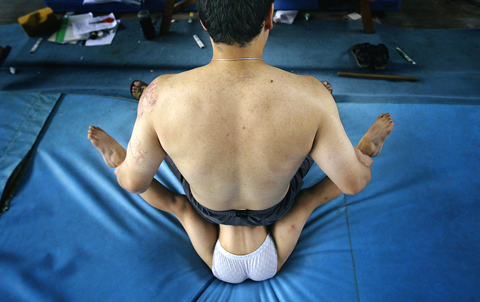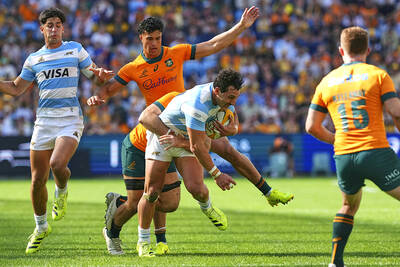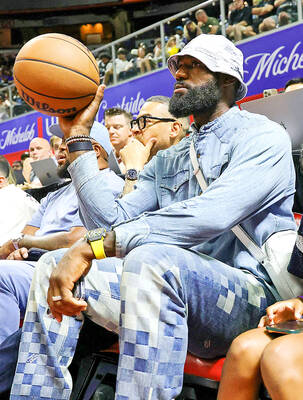If you believe — and many don’t — that Chinese officials have been truthful about the age of their tiny Olympic gymnasts, then the latest reports out of China might make you pause.
Authorities in the south of the country, using X-ray bone analysis because official ID cards seemingly cannot be fully trusted, have unmasked 2,113 young athletes — or perhaps not so young — who may have been fibbing about their age, Xinhua news agency said. That’s a failure rate of 15 percent, because Xinhua says 13,864 athletes were tested in all.
There’s no indication that any of the female gymnasts who won gold for China at last year’s Beijing Olympics were among those tested.

PHOTO: AP
‘VERY INTERESTING’
Nevertheless, the suggestion of widespread age-fakery in China is yet more food for thought for Andre Gueisbuhler, who as general secretary of the International Gymnastics Federation has been fielding the multitude of questions about whether China has competed with girls who were too young.
“Very interesting,” Gueisbuhler said of this week’s revelations from Guangdong Province. “It certainly proves that our doubts as to the age [of Chinese competitors] have a certain — how do you say — have a certain reality.”
Age-fraud is not unique to China. The physically fit have likely been passing themselves off as younger or older than they are since the Romans started conscripting armies. Major League Baseball is investigating 42 Dominican Republic prospects suspected of lying about their age when they signed professional contracts.
As elsewhere, cheating in China is motivated by the desire to win medals and make money.
But the really disturbing question with the Guangdong cases is why authorities there felt they needed X-rays to get to the truth.
What does that say about authorities’ trust in their own documentation? Does that mean official ID cards, the new anti-fraud kind with an embedded computer chip, that Guangdong athletes were told to present aren’t always reliable?
Maybe, because authorities also ordered athletes to submit to fingerprinting.
The same standards weren’t applied with China’s Olympic gymnasts.
FACE VALUE
The International Gymnastics Federation had to take at face value the passports, ID cards and other paperwork that China turned over in answer to persistent doubts that some of its girls at the Beijing Games may not have met the minimum age requirement of 16.
Gueisbuhler said that “for legal reasons” his governing body of world gymnastics is “simply not authorized to use X-rays or to use other scientific ways to check on the age” of competitors it has doubts about.
All it can do is verify their paperwork, and if there is “no contradiction between any of these documents there’s absolutely nothing we can do. So in this sense we have to trust the government.”
Perhaps so. But trust has clearly been getting shortchanged in the government-controlled world of Chinese sports. Only after the Beijing Games, when the international focus of attention had shifted elsewhere, have authorities there seemingly begun in earnest to expose the extent of age-fakery in sports.
In December, the basketball association said it found 36 players in China’s professional basketball league who were older than they originally stated. National head coach Li Yongbo said in October that it is a problem in badminton, too, and had “reached the point where we must speak about, discuss and resolve it,” the Changjiang Times quoted him as saying.
Guangdong conducted the bone-age analyses last year, Xinhua said.
In some cases, tests suggested that athletes were six or seven years over the limit for the age-group in which they competed. Based on the findings, sports officials are revising results from youth competitions in Guangdong last year.
In fact, bone X-rays don’t provide a perfectly accurate measure of real age and, with adolescents, readings can be off by months or even years, which makes Guangdong’s decision to employ them doubly curious. One can only guess that officials there must have had genuine misgivings about athletes’ ages to go to such trouble and expense.
MORE TO COME?
Shanghai Sports University professor Liu Qingzao said the problem is most prevalent in provincial-level competitions in China and he suggested that the Guangdong Province cases may just be the tip of the iceberg.
“It’s a good thing that they caught some of those athletes. But actually, they can catch even more,” he said.
Perhaps gymnasts will be next.
China’s girls at the Beijing Games were all cleared by their paperwork. But the International Gymnastics Federation is still investigating two members of China’s 2000 squad — Dong Fangxiao and Yang Yun. Discrepancies in Dong’s paperwork have suggested that she might have been 14 at the Sydney Games and Yang told Chinese state TV in 2007 that she was 14 at those Olympics.
Yang has subsequently said that she misspoke.

‘DEVASTATED’: Argentina’s win was a reversal of their 28-24 defeat last week, with Australian forward Fraser McReight adding that ‘we did the same thing last week’ Argentina flyhalf Santiago Carreras punished an undisciplined Australia with 23 points off the tee as the Pumas held on grimly for a 28-26 win in Sydney yesterday to breathe new life into their Rugby Championship campaign. A try-fest beckoned in afternoon sunshine at Sydney Football Stadium, but Argentina needed only one through captain Julian Montoya, with Carreras doing the damage with seven penalties and a conversion in front of a sell-out crowd. A week after letting a 14-point lead slip in a 28-24 defeat to Australia in Townsville, Argentina saw most of a 21-point advantage erased in the final quarter as the

ELEVEN STRIKEOUTS: Blake Snell allowed two singles and two walks against the Rockies as he ended a personal three-game skid with his first win since Aug. 16 Blake Snell on Wednesday struck out a season-high 11 in six innings, while Mookie Betts hit a grand slam in the eighth as the Los Angeles Dodgers defeated the Colorado Rockies 9-0 for their fourth straight win. Helped by their third series sweep of the Rockies this MLB season, the Dodgers increased their National League West lead to three games over the San Diego Padres, who lost 2-1 at home to the Cincinnati Reds. Betts went four for five with five RBIs, capped by his seventh career slam on a 3-0 pitch from reliever Anthony Molina to make it 8-0. Andy Pages and

Captain Vijay Kumar led the way yesterday as the Hsinchu Titans claimed the Taiwan Premier League title at the Yingfeng Cricket Ground in Taipei’s Songshan District (松山), beating PCCT by 27 runs. The weather was a topic again, but not the rain that played a role in previous matches in the often-delayed tournament. Kumar, who made 80 not out from 63 deliveries, and teammate Vishwajit Kumar (58 from 43) rescued the Titans from a precarious state at the end of the power play in the T20 match. The visitors were put in to bat and struggled to 26-3 as PCCT

China’s state-run People’s Daily newspaper on Monday published an essay about Chinese basketball it said was written by LeBron James, but a representative for the NBA star said on Thursday that the article was based on a series of interviews. The paper, better known as the mouthpiece of the Chinese Communist Party, had said James authored the essay, “Basketball is a Bridge that Connects Us,” a tribute to Chinese players and fans of the sport written in the first person. “LeBron James Pens an Article in the People’s Daily,” read a post published on the newspaper’s official WeChat account. On Thursday, a representative